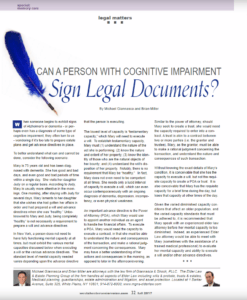Can A Person With Cognitive Impairment Sign Legal Documents?
When someone begins to exhibit signs of Alzheimer’s or dementia – or perhaps even has a diagnosis of some type of cognitive impairment, they often turn to us – wondering if it’s too late to prepare estate plans and get advanced directives in place.
To better understand what can and cannot be done, consider the following scenario:
Mary is 73 years old and has been diagnosed with dementia. She has good and bad days, and even good and bad periods of time within a single day. She visits her daughter Judy on a regular basis. According to Judy, Mary is usually more attentive in the mornings. One morning, after staying with Judy for several days, Mary laments to her daughter that she wishes she had gotten her affairs in order and had prepared a will and advance directives when she was “healthy.” Unbeknownst to Mary and Judy, being completely “healthy” is not necessarily a requirement to prepare a will and advance directives.
In New York, a person does not need to have fully functioning mental capacity at all times, but must exhibit the various mental capacities discussed below when executing a will or the various advance directives. The standard level of mental capacity needed varies depending upon the advance directive that the person is executing.
The lowest level of capacity is “testamentary capacity,” which Mary will need to execute a will. To establish testamentary capacity, Mary must (1) understand the nature of the act she is performing; (2) know the nature and extent of her property; (3) know the identity of those who are the natural objects of her bounty; and (4) understand the will’s disposition of her property. Notably, there is no requirement that Mary be “healthy.” In fact, Mary does not even need to be competent at all times. She needs only a lucid interval of capacity to execute a will, which can even occur contemporaneously with an ongoing diagnosis of dementia, depression, incompetency, or even physical weakness.
An important advance directive is the Power of Attorney (POA), which Mary would use to appoint another individual as an agent to handle her financial affairs. To execute a POA, Mary would need the capacity to execute a contract, in that she must be able to understand the nature and consequences of the transaction, and make a rational judgment concerning the consequences. Mary may have a better understanding of her actions and consequences in the morning, as opposed to later in the afternoon/evening.
Similar to the power of attorney, should Mary seek to create a trust, she would need the capacity required to enter into a contract. A trust is akin to a contract between two or more parties (i.e. the grantor and trustee). Mary, as the grantor, must be able to make a rational judgment concerning the transaction, and understand the nature and consequences of such transaction.
Without knowing the exact details of Mary’s condition, it is conceivable that she has the capacity to execute a will, but not the requisite capacity to create a POA or trust. It is also conceivable that Mary has the requisite capacity for a brief time during the day, but loses that capacity at other times of the day.
Given the varied diminished capacity conditions that affect an older population, and the varied capacity standards that must be adhered to, it is recommended that Mary speak with an experienced elder law attorney before her mental capacity is too diminished. Indeed, an experienced Elder Law attorney would be able to meet with Mary (sometimes with the assistance of a trained medical professional) to evaluate her mental capacity and ability to execute a will and/or other advance directives.
As published in Westchester Senior Voice – Fall 2017

